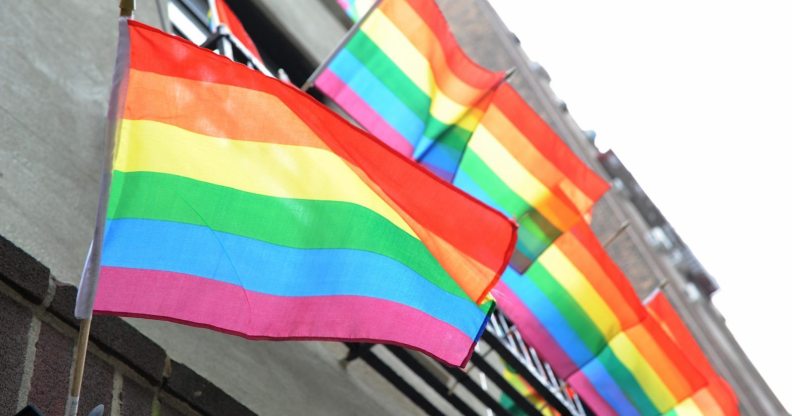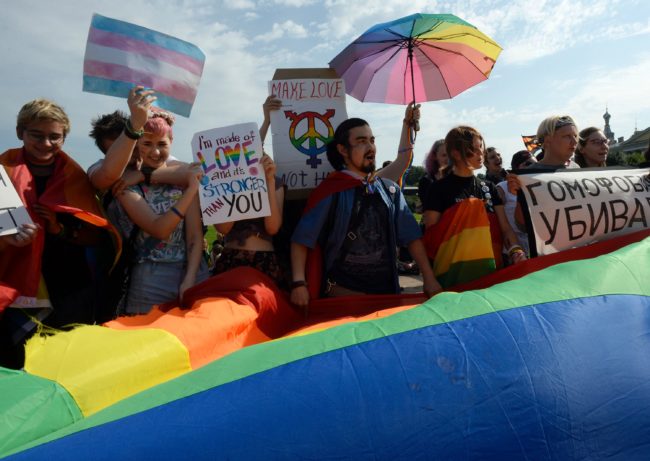Belarus hits out at British Embassy for flying a rainbow flag for IDAHOBIT

LGBT+ Pride flags flutter in the breeze. (Stan Honda/AFP/Getty Images)
Belarus has hit out at the British Embassy in Minsk for flying a rainbow flag to mark an international day against anti-LGBT discrimination.
As part of IDAHOBIT, the International Day Against Homophobia, Biphobia and Transphobia, the British Embassy in the Belarusian capital flew a rainbow flag, posting a video of it on their Instagram account.
Captioning the short video, the Embassy wrote: “To support the LGBT community and draw public attention to the discrimination that LGBT people are constantly facing, the British Embassy posted a rainbow flag today.”
On Thursday, the Belarusian Ministry of Internal Affairs released a statement condemning the British Embassy’s decision to fly a rainbow flag, saying it was “creating problems.”
The statement said: “The initiative of a foreign state to create problems where they do not exist cannot be called good.
“The overwhelming majority of Belarusians adhere to traditional family values, including Christian ones.
“Representatives of same-sex relationships fiercely defend their position, despite the foundations and traditions established in the society.”

LGBT rights protestors in Minsk (VIKTOR DRACHEV/AFP/Getty)
It continued: “No matter which way you look at it but a same-sex relationship is a fake. And the essence of the fake is always the same – the erosion of the truth.
“The LGBT community, and all this struggle for ‘their rights,’ and the very day of the community are just a fake!”
The statement went on to say that IDAHOBIT “was not and is not some kind of memorable and significant” day to mark in the Eastern European country.
Related: ‘At least I know I won’t be killed’: how one gay man fled from Russia to Belarus
A spokesperson for the British Embassy told the BBC that the flag was usually flown each year on May 17 and had not prompted complaints previously.

(ukinbelarus /Instagram)
In 2017, a report said that discrimination in the former Soviet countries of Armenia, Belarus, Kazakhstan and Kyrgyzstan had rocketed.
Amnesty International stressed that LGBT activists and groups were facing an “increasingly discriminatory environment” that was being fuelled by Russia’s crusade against “nontraditional sexual relationships.”
Denis Krivoshev, the deputy director for Europe and Central Asia at Amnesty International, said that the discrimination in the four countries had worsened because of “Russian influence” which calls LGBTQ+ rights “Western values.”

(Photo by OLGA MALTSEVA/AFP/Getty)
Krivoshev explained that the idea that LGBTQ+ equality is “a threat to national security” comes from “a climate of ignorance and hate that’s being fostered by national governments and is even infecting the human rights community in the region.”
“The idea, promoted by Russia, that LGBTI rights are ‘Western values’ that somehow constitute a threat to national security is entrenching elsewhere,” he added.
Distribution of “propaganda of nontraditional sexual relationships” was outlawed in 2016 by Belarus.
LGBTQ+ groups said the move encouraged discrimination and violence against the community.

